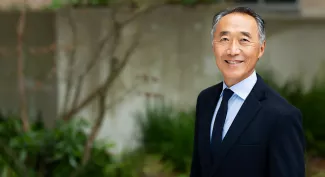Biography
Dr. David Young is Professor of Plastic Surgery at UCSF. His area of expertise includes wound healing, microsurgery, and reconstruction after burns and trauma. His research interests include the molecular mechanisms of wound healing and the epidemiology and treatment of soft tissue infections.
Dr. Young is a graduate of Columbia College and earned a medical degree at the Yale University School of Medicine. He trained in pathology at Cornell Medical College and general surgery at the University of Miami/Jackson Memorial Hospital. He then completed an NIH-NRSA funded research Fellowship at Yale and a Plastic Surgery Fellowship at the University of California, San Francisco.
Education
| Institution | Degree | Dept or School | End Date |
|---|---|---|---|
| University of California, San Francisco | Residency |
Board Certifications
- American Board of Surgery, 1992
- American Board of Plastic Surgery, 1996
Clinical Expertise
Abdominoplasty
Acute Trauma Hand Surgery
Reconstructive Hand Surgery
Aesthetic Surgery
Breast Lift
Breast Reconstruction
Breast Reduction
Breast Augentation
Facial Rejuvenation
Hand and Microvascular Surgery
Liposuction
Microsurgery
Microvascular Reconstruction
Burns and Trauma Reconstruction
Skin Cancer Reconstruction
Wound healing
Clinical Trials
- Related Conditions: Soft Tissue Infections| Start Date:
In the News
Grants and Funding
- Academic Training in Trauma and Burns | NIH | 1988-07-01 - 2013-06-30 | Role: Principal Investigator
- HYPOXIA INDUCIBLE FACTOR-1. &DELAYED WOUND HEALING | NIH | 2004-09-01 - 2010-08-31 | Role: Principal Investigator
- ROLE OF HEAT SHOCK PROTEINS IN CUTANEOUS BURN INJURY | NIH | 1999-09-30 - 2004-09-29 | Role: Principal Investigator
- STUDY OF TRANSPLANTED ALLO-DERMIS &EPIDERMIS | NIH | 1990-12-31 - 1900-01-01 | Role: Principal Investigator
Research Narrative
Dr. Young is primarily interested in the mechanisms and treatments of normal and abnormal wound healing. He is Principal Investigator on a study pertaining to the role of heat shock proteins, homeobox genes, and hypoxia in cutaneous wound healing.
The effects of manipulating of hypoxia inducible proteins, homeobox genes, and heat shock proteins in wound repair are presently under investigation. In vitro and in vivo models of wound repair are used to study the effects of induction and blockage of these proteins on normal and abnormal healing. Expression of many of these proteins is altered in conditions of poor wound healing as found in patients with diabetes.
Dr. Young hopes to understand how these proteins interact during wound healing and to develop novel methods to improve healing. Dr. Young's research is conducted in the UCSF Surgical Research Laboratory at SFGH. The research is currently funded by a RO-1 grant "Diabetes, Hypoxia Inducible Factor-1, and Delayed Wound Healing" from the NIH-NIGMS.
Research Interests
- Molecular mechanisms of wound healing
- Epidemiology and treatment of soft tissue infections
Publications
- Five autism-associated transcriptional regulators target shared loci proximal to brain-expressed genes.| |
 PubMed
PubMed
- A comprehensive AI model development framework for consistent Gleason grading.| |
 PubMed
PubMed
- Artificial intelligence-assisted quantification and assessment of whole slide images for pediatric kidney disease diagnosis.| |
 PubMed
PubMed
- Automatic DNA replication tract measurement to assess replication and repair dynamics at the single-molecule level.| |
 PubMed
PubMed
- Detection of subtle white matter lesions in MRI through texture feature extraction and boundary delineation using an embedded clustering strategy.| |
 PubMed
PubMed
- Preventing Recurrence in Clean and Contaminated Hernias Using Biologic Versus Synthetic Mesh in Ventral Hernia Repair: The PRICE Randomized Clinical Trial.| |
 PubMed
PubMed
- Constructing and optimizing 3D atlases from 2D data with application to the developing mouse brain.| |
 PubMed
PubMed
- Satellite cell activation and retention of muscle regenerative potential after long-term denervation.| |
 PubMed
PubMed
- Whole-Brain Image Analysis and Anatomical Atlas 3D Generation Using MagellanMapper.| |
 PubMed
PubMed
- Contemporary concepts in hernia prevention: Selected proceedings from the 2017 International Symposium on Prevention of Incisional Hernias.| |
 PubMed
PubMed
- Silver microparticles plus fibrin tissue sealant prevents incisional hernias in rats.| |
 PubMed
PubMed
- Biopolymer Molecular Weight Can Modulate the Wound Healing Efficacy of Multivalent Sonic Hedgehog-Hyaluronic Acid Conjugates.| |
 PubMed
PubMed
- The effects of immunosuppressive medications on outcomes in microvascular free tissue transfer.| |
 PubMed
PubMed
- Klotho mice: a novel wound model of aged skin.| |
 PubMed
PubMed
- Rapamycin induces glucose intolerance in mice by reducing islet mass, insulin content, and insulin sensitivity.| |
 PubMed
PubMed
- Application of the chemokine CXCL12 expression plasmid restores wound healing to near normal in a diabetic mouse model.| |
 PubMed
PubMed
- Altered ultrasonic vocalizations in a tuberous sclerosis mouse model of autism.| |
 PubMed
PubMed
- Open incisional hernia repair at an academic tertiary care medical center.| |
 PubMed
PubMed
- HOXA3 modulates injury-induced mobilization and recruitment of bone marrow-derived cells.| |
 PubMed
PubMed
- Effects of decreased insulin-like growth factor-1 stimulation on hypoxia inducible factor 1-alpha protein synthesis and function during cutaneous repair in diabetic mice.| |
 PubMed
PubMed
- Sustained expression of Hif-1alpha in the diabetic environment promotes angiogenesis and cutaneous wound repair.| |
 PubMed
PubMed
- Antibiotic use in the treatment of soft tissue abscesses: a survey of current practice.| |
 PubMed
PubMed
- Inappropriate antibiotic use in soft tissue infections.| |
 PubMed
PubMed
- Hemangiomas and homeobox gene expression.| |
 PubMed
PubMed
- HOXA3 induces cell migration in endothelial and epithelial cells promoting angiogenesis and wound repair.| |
 PubMed
PubMed
- Photochemically knocking out glutamate receptors in vivo.| |
 PubMed
PubMed
- An epidemic of methicillin-resistant Staphylococcus aureus soft tissue infections among medically underserved patients.| |
 PubMed
PubMed
- HoxD3 accelerates wound healing in diabetic mice.| |
 PubMed
PubMed
- HoxD3 expression and collagen synthesis in diabetic fibroblasts.| |
 PubMed
PubMed
- Care of injection drug users with soft tissue infections in San Francisco, California.| |
 PubMed
PubMed

